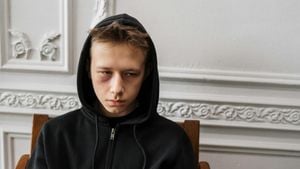On February 10, 2025, the Supreme Federal Court (STF) of Brazil welcomed a delegation from the Organization of American States (OEA), focusing on the pressing issues of freedom of expression within the country. This visit, part of the efforts by the Inter-American Commission on Human Rights (CIDH), aimed to gather insights on Brazil's current state of freedom of expression, particularly concerning recent events impacting social media.
The delegation, consisting of high-profile jurists including STF President Luís Roberto Barroso and Minister Alexandre de Moraes, met with Pedro Vaca Villarreal, the CIDH’s special rapporteur for freedom of expression. This interaction underscored the gravity of the situation surrounding the freedoms and limits on public discourse within Brazil.
During the meeting, Barroso underscored the necessity for decisive action by the STF, citing numerous incidents over the past few years, which have threatened institutional integrity. "This set of events resulted from the invasions of the Three Powers’ buildings on January 8, 2023," Barroso stated, drawing attention to the political climate stoked by incendiary rhetoric from certain public officials.
Minister Moraes elaborated on the court's recent decisions concerning the suspension of the social media platform X, emphasizing the legal framework guiding their actions. He noted, "Over the last five years, about 120 profiles were blocked, dispelling the narrative of widespread removals of profiles," highlighting the court’s measured approach amid accusations of censorship. This number aligns with the investigations stemming from the January 8 attacks, which left close to 1,900 individuals facing legal scrutiny.
The delegation's visit was significant not only for its focus on the court's role and responsibilities but also as part of broader efforts to assess freedom of expression. Villarreal was set to meet with various stakeholders, including government officials, civil rights organizations, and members of the press. This initiative reflects OEA's commitment to examining the diverse perspectives and realities of free expression rights across the region.
Barroso’s and Moraes' discussions highlighted considerable concerns over the risk to democracy posed by calls for violence and undermining of judicial processes. The ministers addressed instances where rhetoric incited actions against the integrity of democratic institutions, particularly those incidents leading to physical confrontations or threats directed at officials.
Yet, the tension between maintaining order and safeguarding free speech continues to define the current Brazilian political atmosphere. Moraes noted, "Every case had oversight from the Attorney General's Office, ensuring no processes were confidential for the parties involved," which aimed to reinforce transparency amid pervasive claims of arbitrary censorship.
The OEA delegation’s presence signifies continued scrutiny and support for monitoring human rights violations within member states. It traces back to growing international concern over how digital platforms interface with free speech issues, including content moderation practices and the responsibilities of online platforms.
The CIDH has received numerous complaints from Brazil, particularly related to the STF's actions perceived as restricting free speech. Reports indicate these investigations and relevant court activities will be under the spotlight as the delegation undertakes discussions beyond Brasília to São Paulo and Rio de Janeiro.
This visit serves as part of the OEA’s broader strategy to engage with national stakeholders, intending to present findings to the Inter-American Court of Human Rights, which could lead to significant repercussions for the Brazilian state if systemic abuses are corroborated.
Barroso concluded the meeting by reiterizing the STF's commitment to upholding constitutional liberties, asserting, "The presidency of the STF is committed to transparency and will allow any necessary follow-up inquiries." The gathering marked the initial step toward multidimensional discussions about freedom of expression at both national and international levels.
The dialogues between the OEA delegation and the Brazilian authorities represent not just the exploration of freedom of expression, but also reflect broader themes of accountability and the functioning of democratic institutions under pressure.



